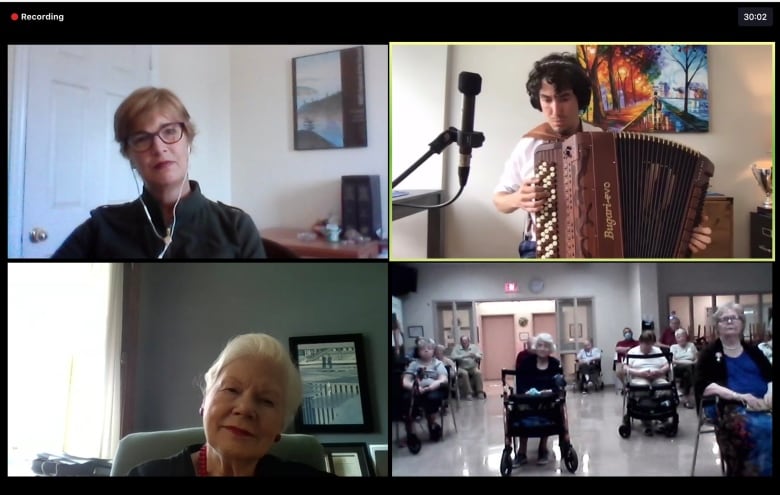When the COVID-19 pandemic forced visitors out of Jack Long’s retirement home, one of the things he quickly missed were concerts.
A professional trumpeter himself, Long grew up in a family of musicians and later founded Long & McQuade, a Canada-wide chain of music stores. So the live performances at his Toronto nursing home each week were a real highlight.
“They were one of the reasons I love this place,” Long said, noting that he and his friends at the residence felt more isolated once the concerts stopped.
While music fans around the world were disappointed when venues closed to slow the spread of COVID-19, the loss of live music was especially detrimental to many seniors in long-term care.
Studies have shown that the benefits of music go beyond uplifting morale, and music has even been prescribed as therapy for people suffering from conditions such as Parkinson’s disease, dementia and depression.
In patients with advanced dementia, for example, vocal ability and physical movement have been shown to improve with music therapy, allowing patients to express themselves more easily.
Studies also show that it can decrease aggressive and agitated behavior in people with dementia. When group singing sessions were studied in patients with dementia, depressive symptoms decreased and participants reported feeling less alone.
The slow and often frustrating movement disorders common with Parkinson’s disease may also improve after such therapy. Today, a number of long-term care homes and hospitals now employ music therapists.
So when restrictions were introduced to protect vulnerable residents from COVID-19 in many long-term care homes, organizations stepped up to find ways to fill that musical void.
Over the past 10 years, Concerts in Care (CIC), a Toronto-based nonprofit, has hosted over 2,100 concerts for seniors at various care homes in the Greater Toronto Area. When the pandemic hit, the group knew they had to get back to those spaces quickly.
“We are a lifeline for memories, connections and social interactions – even on Zoom or through our recorded live videos,” said Debra Chandler, Executive Director of CIC.
Since the start of the pandemic, Concerts in Care has staged some 145 live Zoom concerts and additionally offers 35 recorded concerts, reaching audiences in communities across Ontario where professional musicians are often harder to find, such as Cornwall, Peterborough and Thunder Bay. .
The group has also held performances outdoors and remotely, where possible.

Chandler recalled an experience where a trumpet player was able to play from a balcony across from a nursing home. She also knows a group of women in Sudbury, Ont., who meet weekly to watch the organization’s live Zoom concerts.
Impact felt by the artists too
It wasn’t just older audiences affected by the strict visitor bans brought on by the pandemic; performers like Brenton Chan, a professional cellist at the University of Toronto and a former orchestral player, found themselves out of work.
Chan had enjoyed performing in senior residences, which was his main job. His setlists were flexible, as he responded to requests, and instead of going backstage after performances, he was able to stay and chat with the residents and listen to their stories.
But when the pandemic meant he was shut out, Chan — and other musicians like him — struggled to find ways to perform live music.
The virtual concerts offered by CIC provided an opportunity to “reopen their lives,” Chan said, providing a pathway to perform despite public health restrictions.
Elizabeth Dowdeswell, Lieutenant Governor of Ontario, wanted to help when she learned of the loss of concerts in nursing homes. Her mother was an opera singer and would fill her childhood home with singing and playing the piano – memories that are dear to her.
Building on that love of music, Dowdeswell said she saw an opportunity to both support isolated seniors and help employ Ontario musicians when she learned how CIC had been excluded.
“It was like killing two birds with one stone,” she said.

Dowdeswell helped launch the first CIC concerts on Zoom in late July 2020. The online broadcasts reached thousands of people in the first months they were offered, and live Q&A sessions were offered to all seniors watching live, allowing for some socialization and giving seniors a chance. to chat in real time with the artists.
And even though the shows were offered virtually, Dowdeswell described the Concerts in Care experience as intimate. “You could see people’s living rooms and see into their lives,” she said.
“The hybrid is here to stay”
Going forward, Concerts in Care plans to pursue a combination of in-person and online programming, allowing the organization to be flexible in delivering high-quality performances for seniors.
“Hybrid is here to stay,” Chandler said, noting that by offering its concerts in new and virtual formats, the band is further diversifying its audience.
“While our seniors are again isolated in their rooms or on their floors, we will do everything we can to get the music to them,” she said.
And while Chan was able to return to in-person performances, he says he’s come to appreciate the flexibility that virtual performances allow.
Artists performing online could have more time to chat during and after performances, without the added pressure of travel time, he said. And musicians have the opportunity to “show parts of their lives”, like their children or their pets.
The expansion of Concerts in Care during the pandemic has created challenges for the organization: it now maintains a wider network of musicians and care homes, and the transition to a hybrid model requires additional funding.
But Chandler says the benefits of connecting with previously inaccessible populations and the flexibility it allows far outweigh the challenges.
“Music helps older people connect with memories and feelings,” she said.
And for them, music is an essential service.

